Aida in Japan
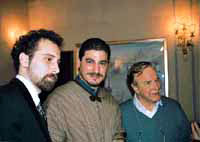 |
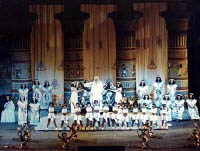 |
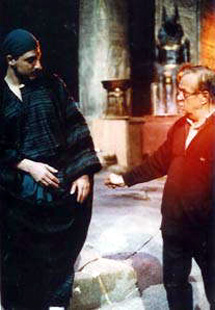 |
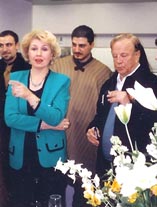 |
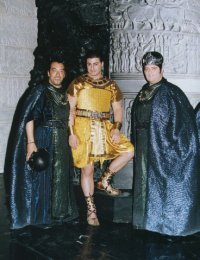
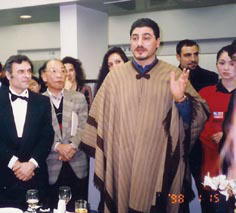
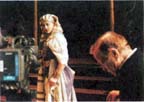 |
 |
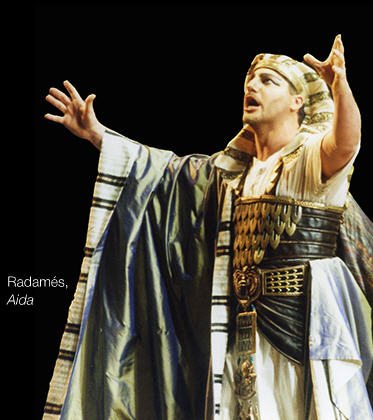

.jpg)
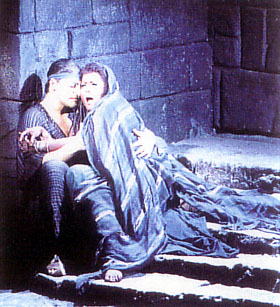
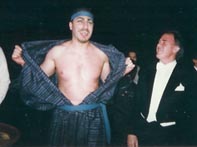
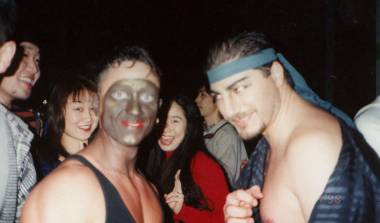
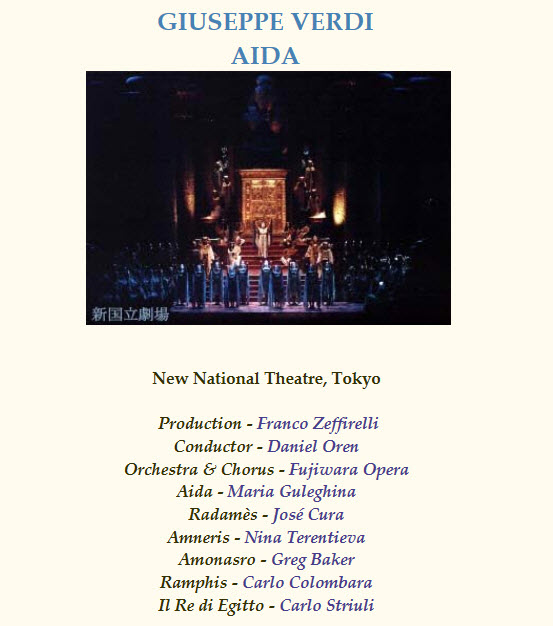
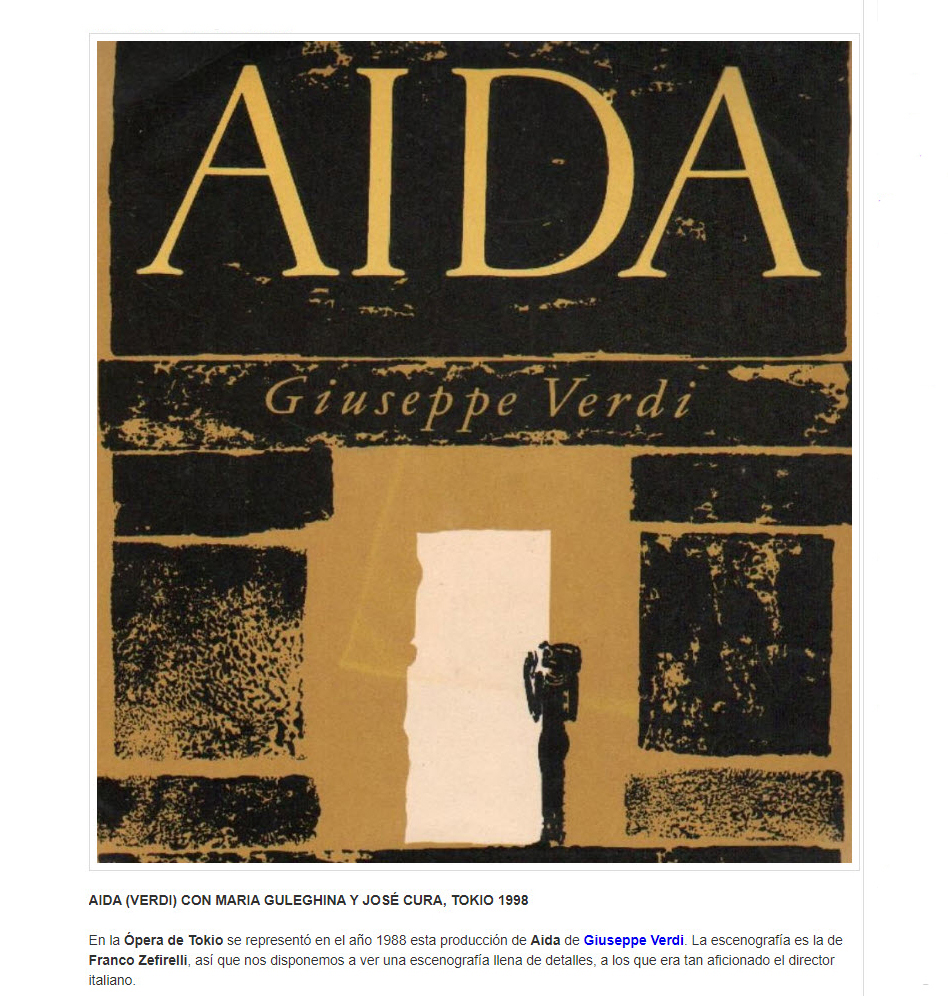
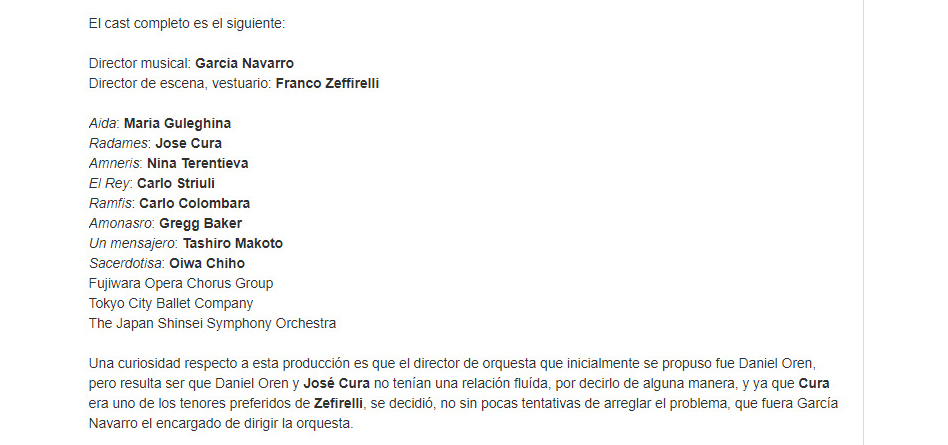
%20Ryoko.jpg) |
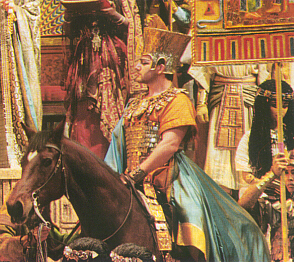
|
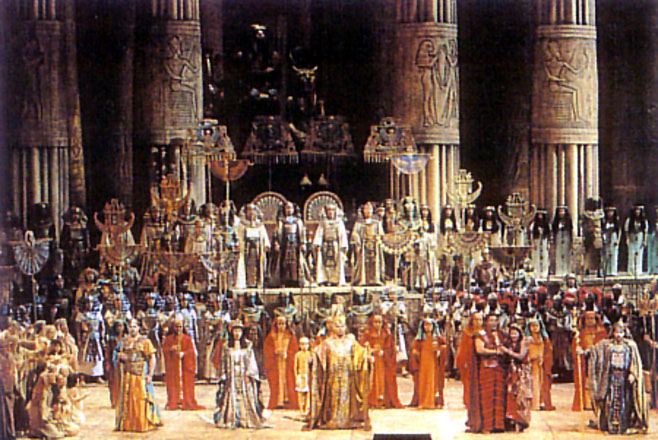
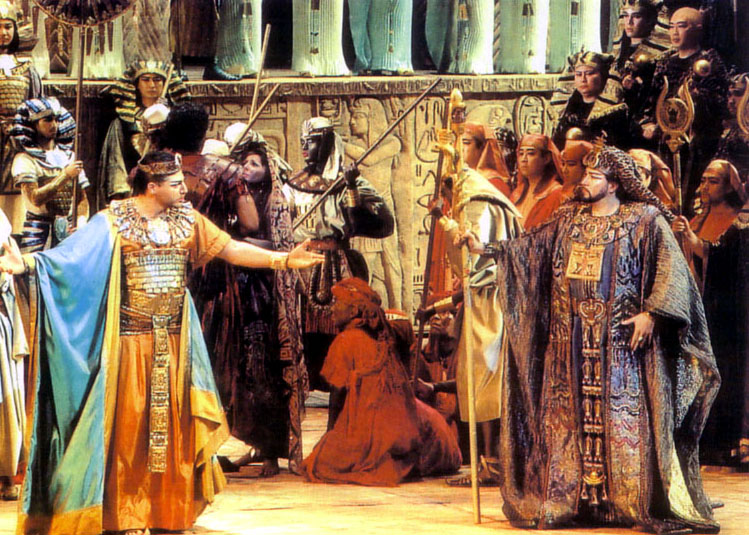
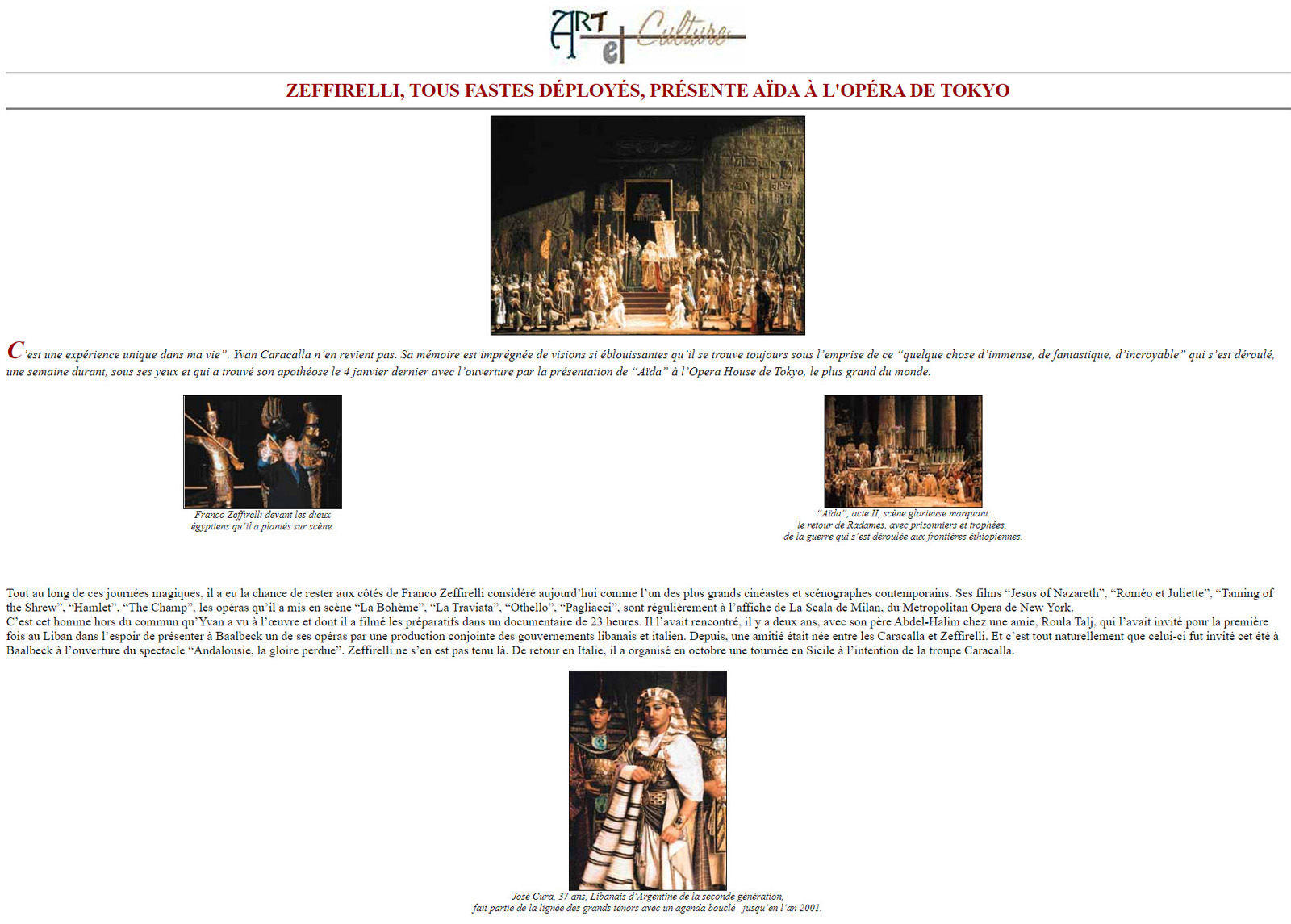
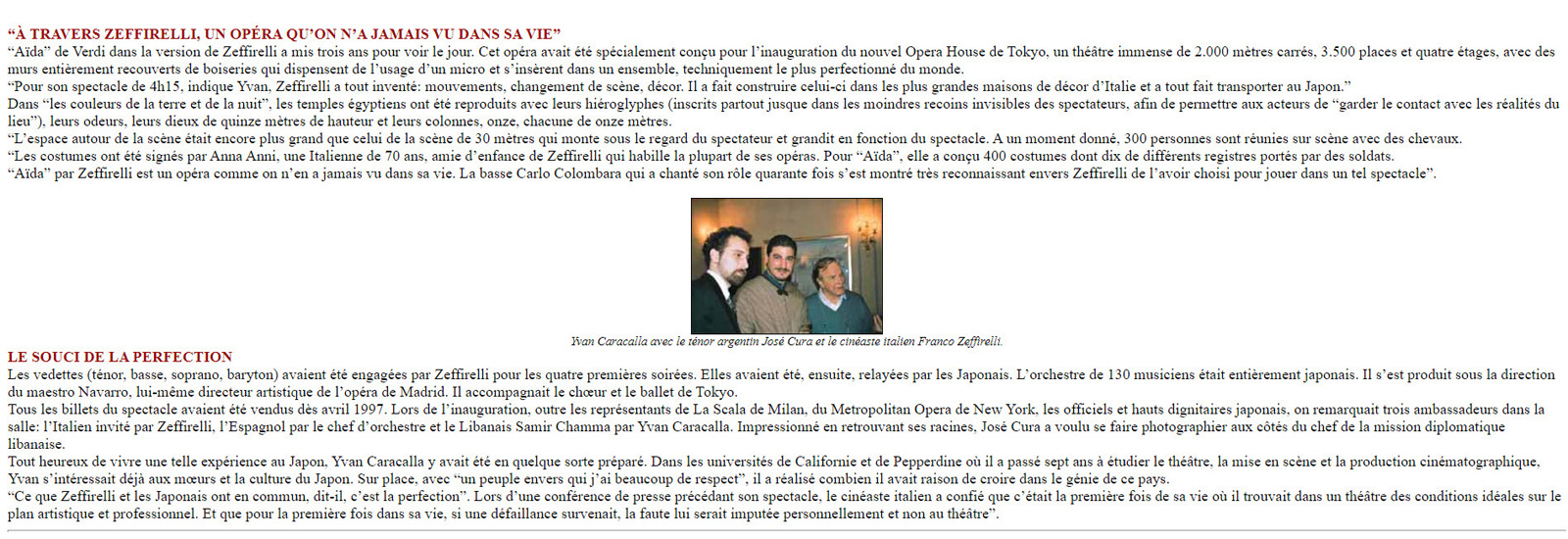
Bravo Cura
Celebrating José Cura--Singer, Conductor, Director
Operas: Aida
|
Aida
|
|
Aida in Japan
|
|
||||||||
|
|
|||||||||
|
|
|
|
Aida in Palermo
|
|||||
|
|
|
|
|
||
|
|
|
|
|
Palermo, you won’t miss Pavarotti José Cura is ready for the challenge of Aida at the Massimo
Originally published in Republic 1998 “I hope to satisfy the expectation of the citizens of Palermo: I know the wait is long and I also know that some are disappointed by Pavarotti’s absence. But perhaps these people will be glad I came to Palermo.” José Cura, the Argentine tenor called to substitute for Pavarotti in Aida at the reopening of the theatre, has clear ideas: he knows he is one of the few singers in the current market able to bear the vocal marathon of Radamès and prevent people from regretting the absence of Pavarotti. The thought of substituting for Pavarotti doesn’t worry him. “The changing generations is something we have to tackle sooner or later," Cura, the 35-year-old Argentine with Piedmont grandmother and rising star of the international opera scene, said. "I am proud to be the one chosen to substitute for such a great artist. The reopening of the Massimo is one the most important cultural events at the end of the century in Italy, and perhaps in the entire world. That the honour of reopening the opera house should belong to an Italian tenor is natural. But we know that Pavarotti, even if his voice is in wonderful condition, has the physical problems associated with a man nearly 65 years old. Radamès requires a big physical effort and so here is a moment when the generations change. To come to Palermo meant I had to change my calendar completely. It’s a miracle that I managed it.” Anyway, you are used to excellent “substitutions”... José Cura: Yes, the Pavarotti one is the third I've done. This year I’ve already substituted for Placido Domingo in Otello and José Carreras in Carmen. Now I’m substituting Pavarotti. I leave the conclusions to other people. Once upon a time there were three tenors. Is there only José Cura now? J. C.: There are very great colleagues on the market, but I’m the only one, or almost the only one, suited to sing the heroic repertory, at least in the new generation. Let’s talk about Radamès now that you have already performed in Tokyo with Zeffirelli as director: What are the vocal difficulties of this role? J. C.: When I performed Otello everyone told me: be careful, it’s a massacre. And I answered that they had no idea of how hard Radamès was, that it is vocally much more difficult. The “keeping” of this character in the four acts of the opera is one of the hardest one of the Verdi’s repertoire. Immediately, as the curtain rises, the tenor must perform “Celeste Aida” and that's a big test. I think I’ve found a personal way of performing this aria and I hope I’ll do well with it in Palermo. What do you like most in Aida? J. C.: The great music of Aida begins in the third act. It’s the more modern part, the more theatrical one while the first two acts are cliché. Aida has become the opera that can satisfy the masses who want to see the great spectacle but also appeal to those who want to listen to the revolutionary Verdi found in the third and fourth acts. How important has been the experience of the Otello conducted by Abbado? J. C.: It has been a turning point of my career. I demonstrated that Otello could be done in a different way. Many people appreciated my modern reading, while other people criticized me. But that’s normal. It’s a risk I had to take to grow as an artist. You are arriving to Palermo on April 14, a few more than a week before the debut. Isn’t the time too short for the rehearsal? J. C.: It's a miracle [with my calendar] that I am able to come at all.
|
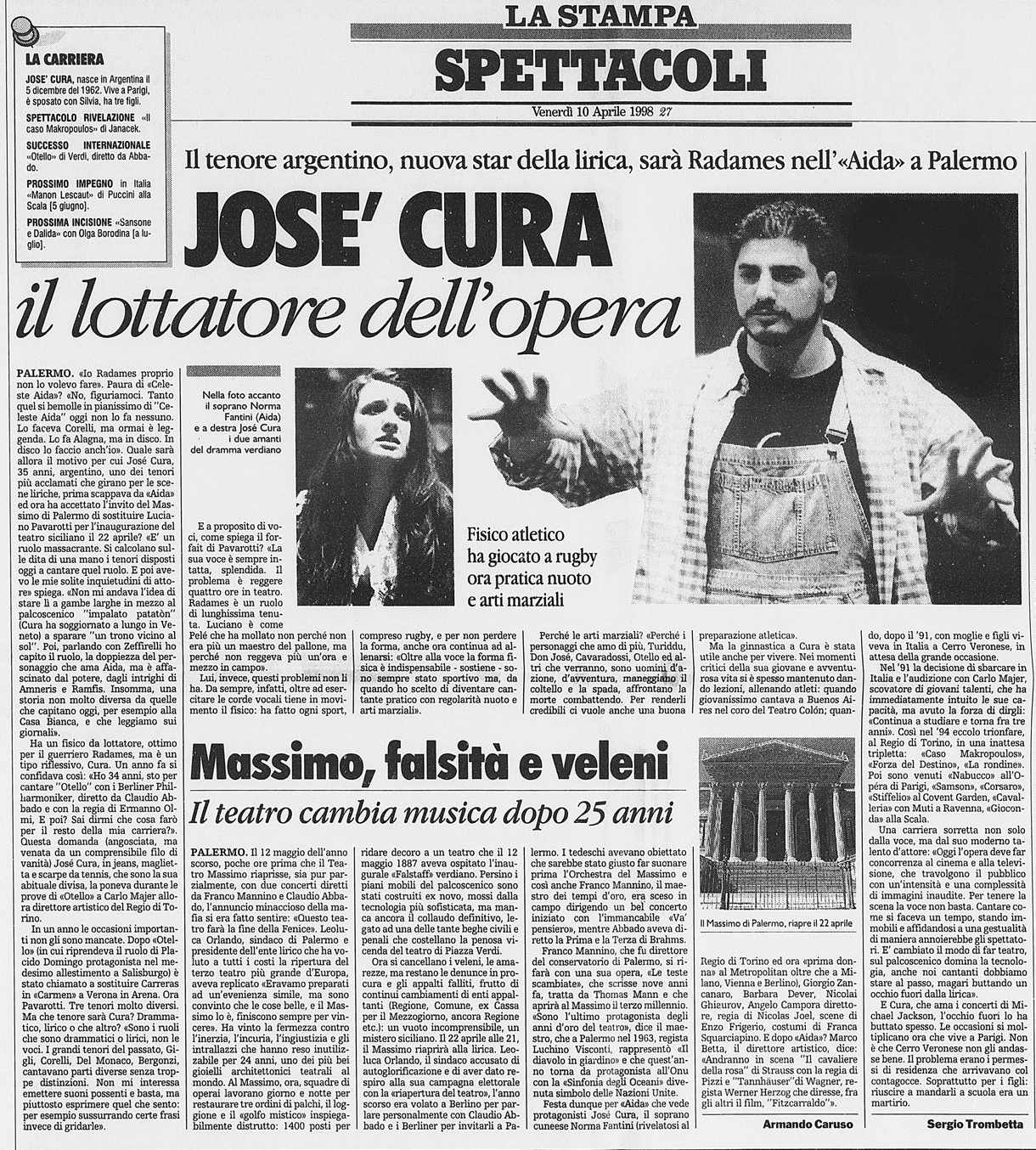
|
José Cura, the Opera Wrestler La Stampa Sergio Trombetta 10 April 1998
Parlemo. "I just didn’t want to do it.” Afraid of Celeste Aida? “ Me? Afraid? No way! Nowadays no one does it that B flat pianissimo. Corelli use to do it, but that’s now something of a fairy tale; Alagna does it, on record, but on record I do it, too.” What then is the reason why José Cura, 35 years old, an Argentine, one of the most acclaimed tenors on the opera stage, first ran away from Aida and now has accepted the Teatro Massimo di Palermo's invitation to replace Luciano Pavarotti for the inauguration of the Sicilian theater on April 22?
“It’s a very, very demanding role and you can count on the fingers of one hand the tenors willing to undergo such a slaughter. Quite frankly, my only perplexities regarded my acting for this specific role; I did not feel comfortable standing in the middle of the stage with my legs wide open planted there like an impaled potato” – an expression Cura has learned by living in the Venetian region for over four years. “And in such a pose, having to shoot out “un trono vicino al sol” but then talking to Zeffirelli I understood the role, the duplicity of the man who loves Aida but is fascinated by power, by the machinations of Amneris and Ramfis. All in all, a story that is not much different from what goes on in our day and age, take for example the White House and whatever else the dailies dish out.”
Cura has the physique of a wrestler, quite perfect for a warrior role like Radames, but he is also the introspective type. Only a year ago he confided, “I am 34. I am going to sing Otello with Abbado and Berliner Philarmoniker, and then? Can you tell me what else I can do for the rest of my career?” This question, delivered with a bit of anguish but also with veiled vanity, was put by José Cura, in jeans, T-shirt and tennis shoes, which are his usual uniform, to Carlo Majer, then artistic director of the Regio di Torino, during the Otello rehearsals.
In a year since he has not missed important occasions. After Otello (in which he took on the role of Placido Domingo who was the protagonist in the same staging in Salzburg) he was called to replace Carreras in Carmen in Verona in the Arena. Now Pavarotti. Three very different tenors. But what tenor will Cura be? Lirico, then drammatico, and now what else?
“The roles are dramatic or lyrical, not the voices. The great tenors of the past, Gigli, Corelli, del Monaco, Bergonzi, sang all kinds of roles without too much difference. I am not interested in trumpeting some powerful notes and nothing else. I am more concerned about expressing my feelings, for example by whispering certain lines instead of belching them out.”
And how does Cura explain Pavarotti’s latest forfeit? “His voice is still intact, as splendid as ever. The problem is to stand up for four hours on the planks of the stage. And Radames is a heavy role. Luciano is like Pele. He has bailed out not because he wasn’t the master of football any longer, but because he couldn’t face 90 minutes standing in the ballfield.”
He, however, does not have these problems. In fact, in addition to exercising the vocal cords, he has always kept his body moving: he has done every sport, including rugby, and in order not to lose shape, he continues to train even now: "In addition to voice, physical and indispensable fitness. Besides keeping my voice fit it is indispensable to keep physically fit. I have always been a sports fellow but since I got into this profession I practice swimming and martial arts regularly.”
Why martial arts? “Because I love those wrestlers like Turridu, Don José, Cavaradossi, Otello and the like. They are active people, adventurous. They swing swords and knives and face death fighting. To make them more credible one needs adequate athletic preparation.”
But exercise has been a survival tool for Cura. During the crucial moments of his young and adventurous life Cura managed to make a living as an athlete and a coach; as a budding artist in Buenos Aires he sang with the choristers of the Teatro Colón; in 1991 he moved to Italy with wife and children and settle at Cerro Veronese in the Venetian region, waiting for his chance.
After an audition in Torino, Carlo Majer told him to keep studying and in three years there will be some possibility. And yes, in 1994 in Torino Cura starred at the Regio, not in one but three operas—The Makropoulos Case, Forza del destino and La rondine. After that came Nabucco in Paris, Samson, Corsaro and Stiffelio at Covent Garden, Cavalleria in Ravenna with Muti, and Gioconda at La Scala.
A career supported not only by his voice, but by his modern acting talent. “To keep up with television and movies competition, opera can no longer rely on great voices only. Once can no longer stand in the center of the stage and raise one hand and then the other, those gestures would bore the audience to death. Theater has changed, the stage is state-of-the-art technology and singers must keep up with the times and watch what’s going on in other forms of art besides opera.”
Now that he has settled in Paris his chances of watching what’s going on have increased. Not that the Venetian countryside didn’t suit him, just the boring bureaucracy of having to go through all the redtape of Italian immigration authorities who issued residency permits as if they were distilling them. And the schooling system for the children in Italy was a pain in the neck….
|
|
|
|
|
|
|
|
|
|
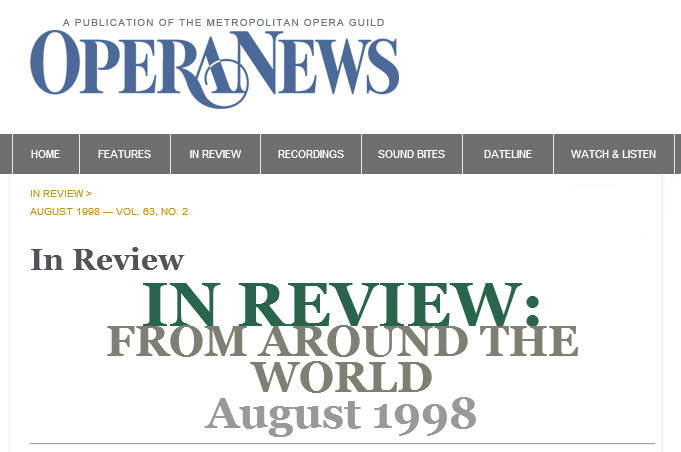
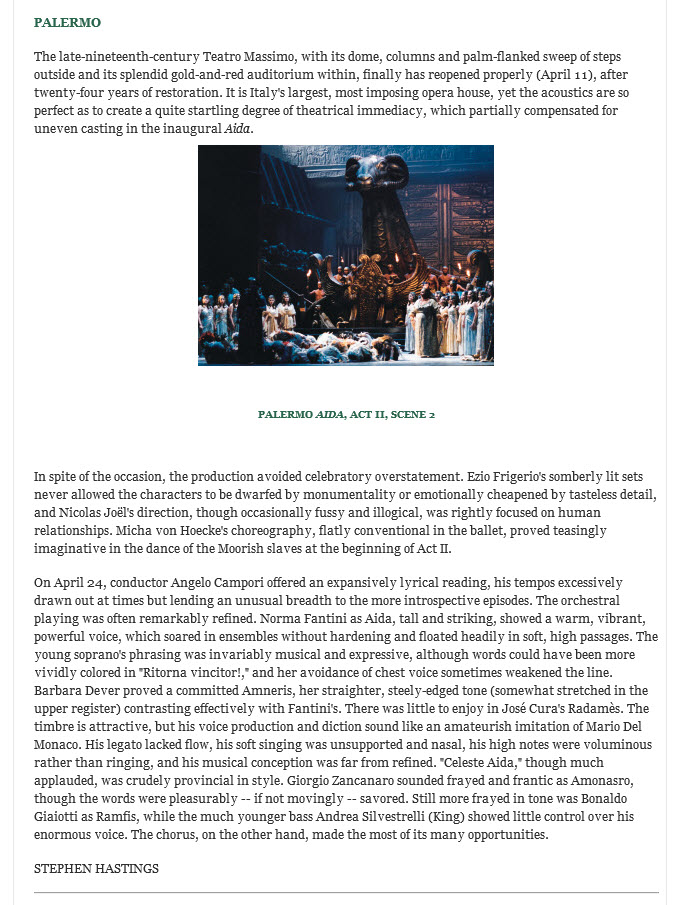
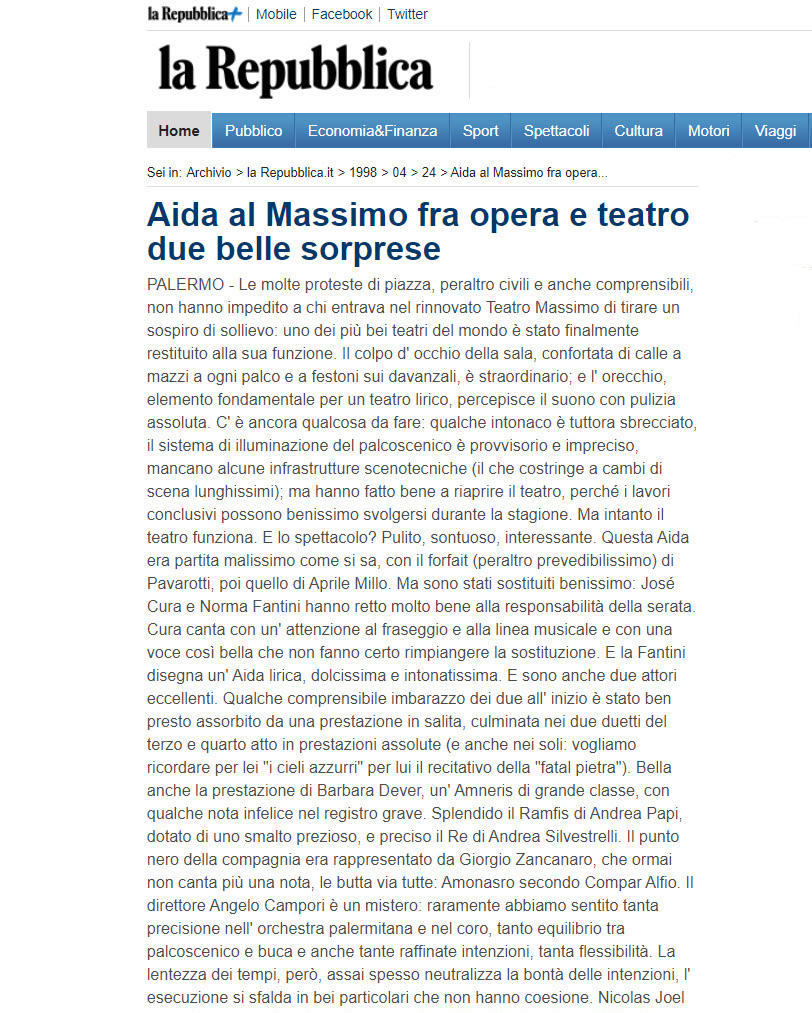 |
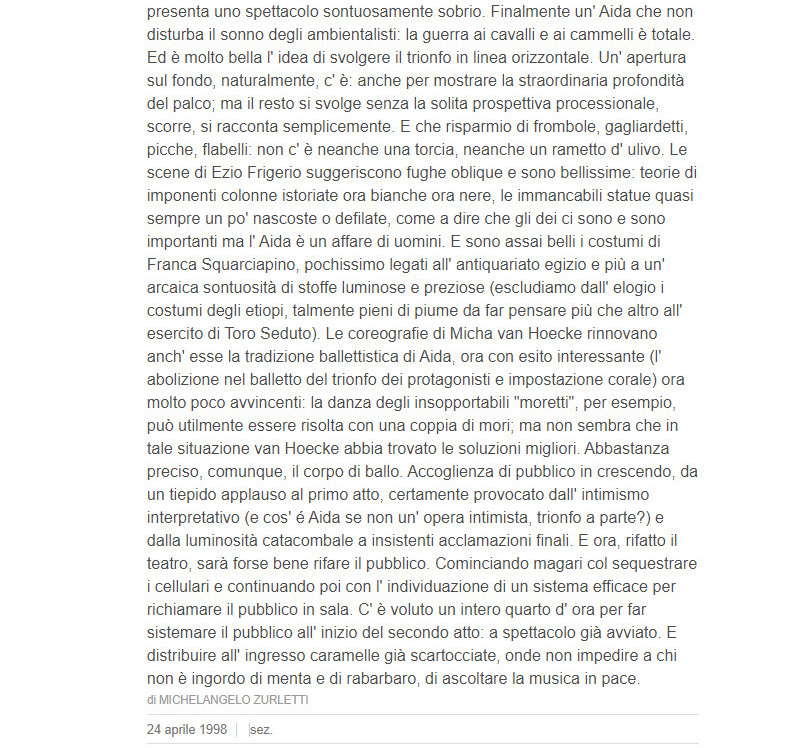 |
|
Aida at Massimo between opera and theater two nice surprisesLa RepubblicaMichelangelo Zurletti24 April 1998[Excerpt]PALERMO - The many protests in the square, which are both civil and understandable, did not prevent those who entered the renewed Teatro Massimo from breathing a sigh of relief: one of the most beautiful theaters in the world has finally been returned to form. The glance of the room, comforted by calla lilies at each stage and festoons on the windowsills, is extraordinary; and the ear, a fundamental element for an opera house, perceives sound with absolute cleanliness. There is still things to do: some plaster is still chipped, the stage lighting system is provisional and imprecise, some stage machinery is still to come (which caused the long intermissions for changes of scenery); but they did well to reopen the theater, because the final works can very well take place during the season. But in the meantime the theater works.
And the show? Clean, sumptuous, interesting. This Aida has been plagued with problems, first with the (very predictable) forfeit of Pavarotti, then with the broken leg of April Millo. But they were replaced very well: José Cura and Norma Fantini held up very well to the responsibility of the evening. Cura sings with an attention to phrasing and to the musical line and with a voice so beautiful that certainly no one could regret the replacement. And Fantini offers a lyrical Aida, very sweet and perfectly tuned. And both are also excellent actors.
Some understandable hesitation at the beginning was soon forgotten by a truly ascending level of the performances which picked up very quickly to climax in the Act 3 and four duets (also of note was her "O cieli azzurri" and his recitative of "Fatal Pietra"). Good also was the performance of Barbara Dever, a high class Amneri with some sloppy, unhappy notes in the low register. The Ramfis by Andrea Papi was splendid, endowed with a precious luster, and the King by Andrea Silvestrelli was precise. The dark point was represented by Giorgio Zancanaro, who no longer sings one single note since he throws all of them out.
The conductor Angelo Campori was a mystery: rarely have we heard such aplomb from the Palermo orchestra, and the chorus, too, such a balance between the orchestra pit and the stage and so many fine intentions, and what a great flexibility; but the sluggish tempos all too often blurred the good intentions and the whole thing falls apart. |
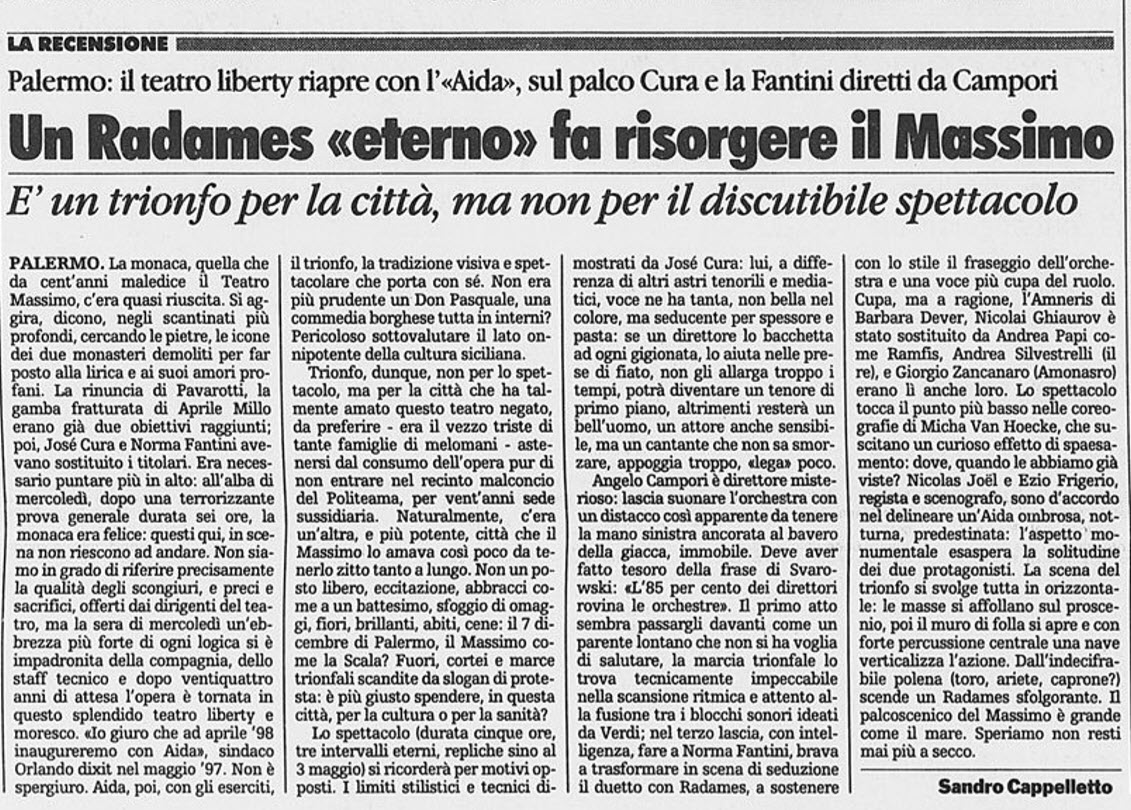
|
An "eternal" Radames resurrects the Massimo A triumph for the city but not for the debatable show La Stampa Sandro Cappelletto 24 April 1998 The nun, the one who has cursed the Teatro Massimo for a hundred years, was almost successful. She wanders, they say, looking for the relics of the two monasteries demolished to make room for the temple of opera buffs’ profane love. Pavarotti's cancellation, Aprile Millo's fractured leg were already two goals achieved; then José Cura and Norma Fantini replaced the original singers. It was necessary for the nun to aim higher: at dawn on Wednesday, after a terrifying six-hour general rehearsal, the nun was happy: they are unable to continue. We are unable to report precisely the quality of the woes or what was offered as sacrifices by the directors of the theater, but on Wednesday evening a drunkenness stronger than any logical took hold of the company … Aida, after twenty-four years of waiting, returned. […] The show (lasting five hours, three eternal intervals, repeats until May 3) will be remembered for opposite reasons. The stylistic and technical limits demonstrated by José Cura: unlike other great tenor superstars, he has plenty of voice, not beautiful, but seductive in thickness and texture: The recipe for a Cura superstar is a conductor who corrects him when he becomes overindulgent, one that makes it easy for him to catch his breath, and does not slow down the tempos. With such remedies Cura may become a first class tenor; otherwise he will remain a handsome fellow, a sensible actor, but a singer who is incapable of smorzandos, abuses appoggio, and blends poorly.
|
|
Aida at the Arena 1999
|

|
Note: This is a machine-based translation. We offer it only a a general guide but it should not be considered definitive. Blue Lights in Egypt Der Standard 28 June 1999 [ Excerpt ] Computer translation
Despite promising names, Aida was in scenic distress with blue lights in Egypt. In Verona, a mediocre premiere like that of Aida for this year’s opening is a reason for local press to cheer. The Veronese daily paper L’Arena even supplemented its edition from last Saturday with a special section, with the title page, in big letters, reading “Aida brings the World to Verona.” […] About 15,000 spectators were on hand for opening night to experience the blue miracle. Pier Luigi Pizzi, who was responsible for the staging, stage design and costumes, apparently has the best relationship with the paint industry, where a large excess of ultramarine blue is believed to have accumulated. The producer was responsible for ridding them of the surplus. A huge pyramid was emblazoned on the stage of the arena. Not only was it blue but so were the gates and status grouped around it, as were the costumes of the actors, as was even the light. After all, blue light is considered an international emergency signal - and it was not difficult to locate the distress that this evening had gotten into: it consisted of the fact that it had no other depth than this blue color. And this despite the promising name on the cast: José Cura as Radames and Leo Nucci as Amonasro are definitely striking – and largely remained so. Like many of his colleagues, Cura only reached his full form during the strange death scene, which took place in a strange box. Leo Nucci lacked overall creative power. The two women - Sylvia Valayre in the title role and Larissa Diadkova as a vocal and personally very present Amneris - did not have to try hard to overshadow their prominent colleagues. Daniel Oren conducted an Aida that was quite uninteresting in terms of dynamic and rhythmic sensitivity. |
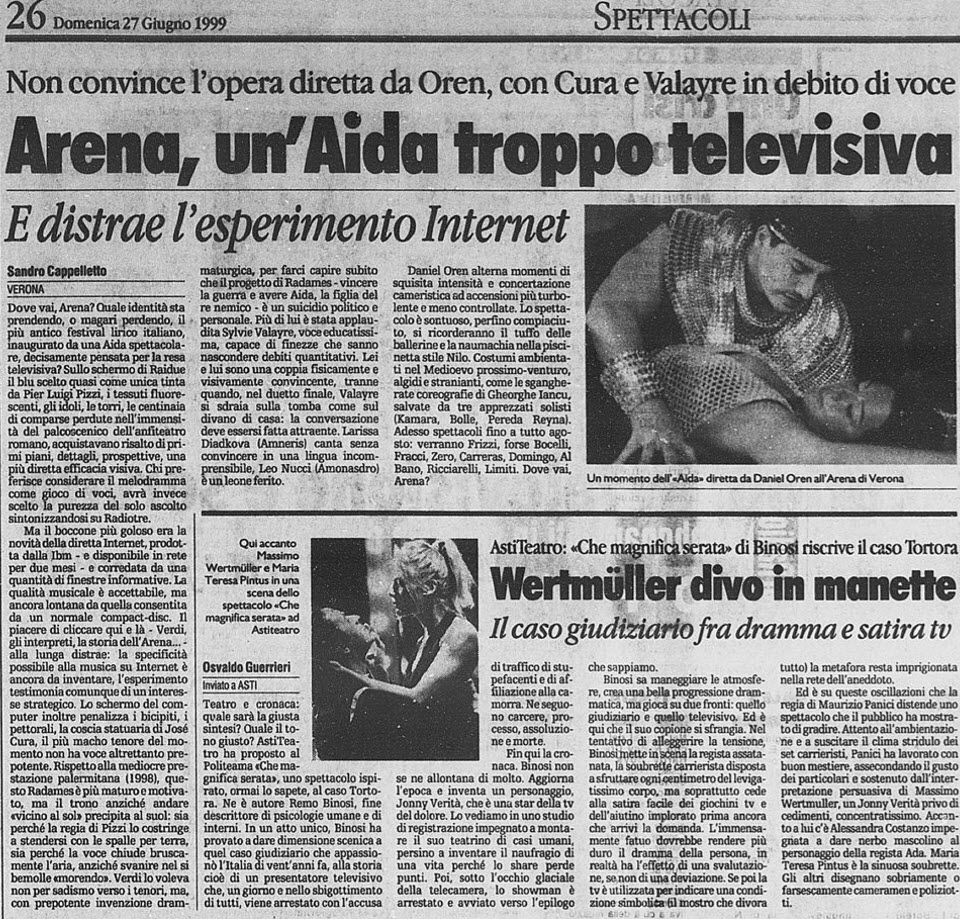 |
|
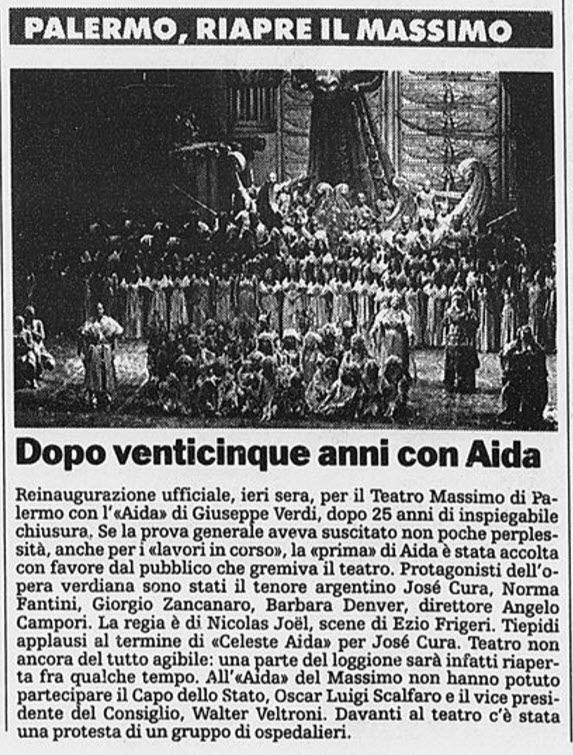 |
|
| Aida in Athens 2001
|
|
||
|
|
|||
|
Aida 2001 - Japan Tour
|
|
| Pro Japonce je připravena Aida Státní opera Praha odlétá 24. 10. na měsíční turné do Japonska. Na svých předchozích třech turné po Japonsku uvedla Mozartovu Kouzelnou flétnu a Straussova Netopýra, tentokrát nabídne poprvé verdiovský titul, a to Aidu. Proto také tato opera chyběla letos na Verdi festivalu v srpnu a září, protože dekorace byla v té době již na cestě do Japonska. Během měsíce uvede soubor Státní opery Aidu celkem 22x v řadě japonských měst - například Hamamatsu, Nagasaki, Fukuoka, Osaka, Nagoya, Sapporo a pět v Tokiu. Představení bude dirigovat italský dirigent Giorgio Croci a Jiří Mikula, vedle sólistů Státní opery, paní Andy-Louise Bogzy, Jordanky Derilovy, Nikolaje Višňakova, Jiřiny Přívratské, Galii Ibragimovy, Milana Bürgera, Olega Korotkova, Jurije Kruglova, Richarda Haana, Lubomíra Havláka a Márii Haan se japonskému publiku představí další - zahraniční - hosté Státní opery, italská sopranistka Simona Zambruno, německý barytonista Johannes von Duisburg a italský tenorista Francesco Petrozzi. Diváci v Nagasaki a v Osace uvidí jako Aidu americkou sopranistku Phenisher Harris.
Soubor Státní opery bude mít ovšem v 6 představeních v
Tokiu, Osace, Nagoye a Hamamatsu naprosto jedinečného Radama,
a to devětatřicetiletého argentinského tenoristu a
současnou světovou tenorovou jedničku José
Curu. Je dnes považován za nástupce Luciana Pavarottiho
a označován za tenoristu 21. století a určitě
ho není nutné našim divákům blíže představovat, málokdo
ale asi ví, že profesionálně debutoval José Cura v roce
1994 v Turíně jako Albert Gregor v Janáčkově
Věci Makropulos. Jeho partnerkou bude v roli Aidy sólistka
Státní opery Anda Louisa Bogza, která mimochodem právě
v této roli debutovala letos v červnu ve Vídeňské
státní opeře. Zdroj Státní opera Praha |
|
Note: This is a machine-based translation. We offer it only a a general guide but it should not be considered definitive. Aida is Ready for Japan [Excerpt]
The Prague State Opera will depart on October 24 [2001] for a month-long tour of Japan. Mozart's Magic Flute and Strauss's Die Fledermaus were performed on its previous Japan tours; this time it will offer its first Verdi title, Aida. That is why the opera was missing at the Verdi festival in August and September earlier year: the set decoration was already on its way to Japan.
During the month, the ensemble the Prague State Opera will perform a total of 22 times in a number of Japanese cities, including Hamamatsu, Nagasaki, Fukuoka, Osaka, Nagoya, Sapporo and five times in Tokyo. The performance will be conducted by Italian conductors Giorgio Croci and Jiří Mikula, alongside soloists of the State Opera.
However, the State Opera ensemble will have an absolutely unique Radames in 6 performances in Tokyo, Osaka, Nagoya and Hamamatsu: José Cura, the 39-year-old Argentine tenor and the current world number one tenor. His partner in the role of Aida will be the Prague State soloist of Louisa Bogza.
|
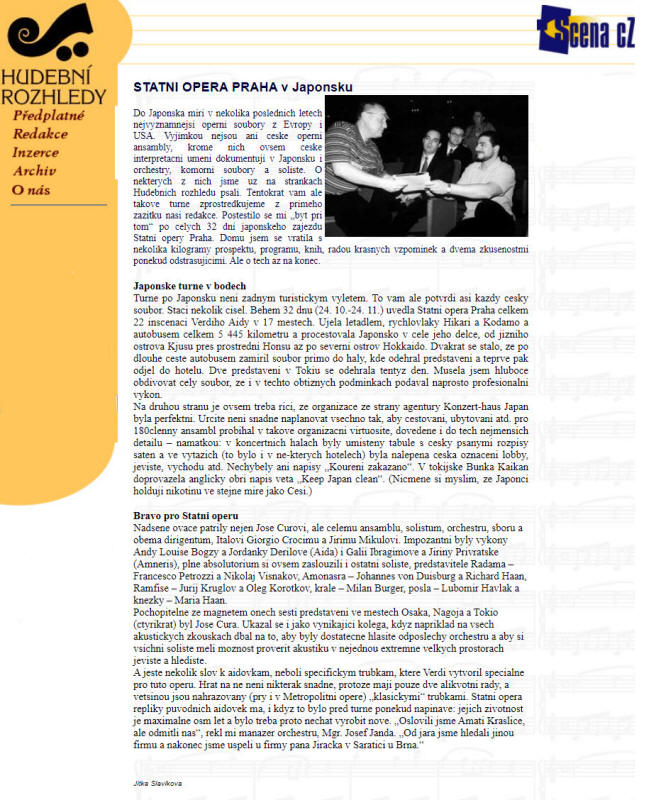 |
|
|
|
|
|
Aida at the Arena 2005
|
|
|
|
|
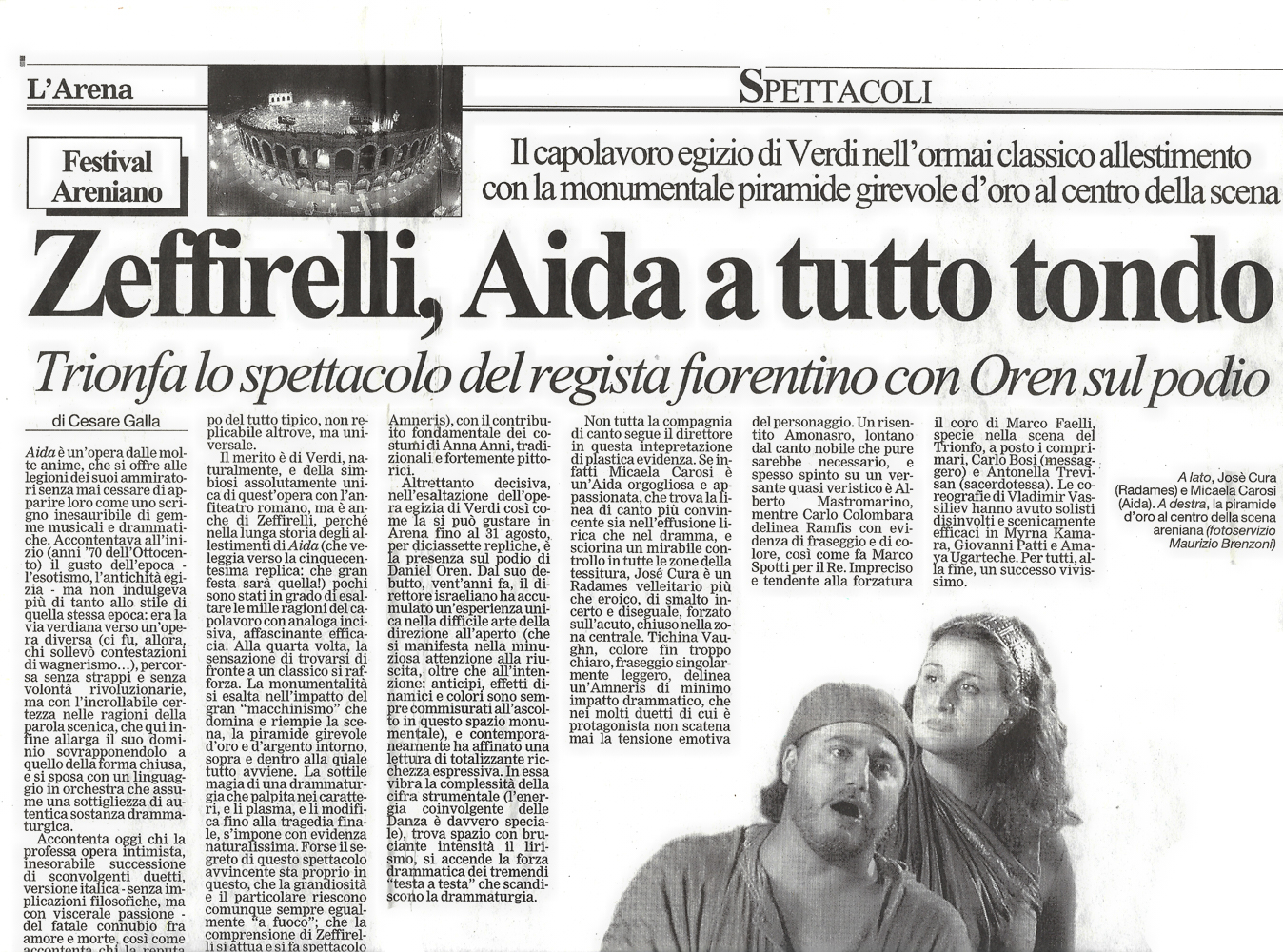
|
José Cura is a heroic Radamès, of uncertain and unequal polish, forced on the high notes and secure in the middle register.
|
|
|
|
Last Updated: Sunday, August 18, 2024 © Copyright: Kira